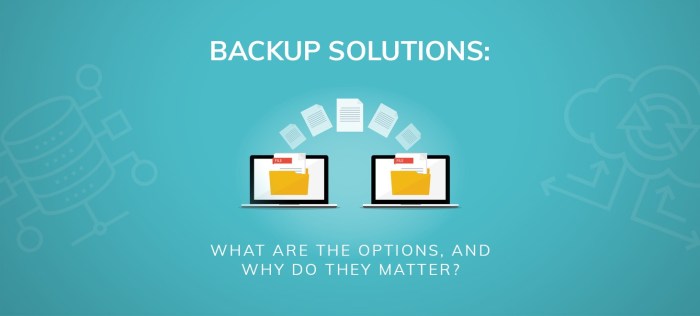Why You Need a Backup Solution for Your Hosting Service is a crucial topic for anyone who relies on their website for business or personal needs. In today’s digital world, data is essential, and losing it can have devastating consequences. From server failures and hacking attempts to simple human errors, the potential for data loss is always present. Imagine losing your website’s content, customer data, or even years of valuable business records.
The financial and reputational damage could be significant. A reliable backup solution is not just a good idea; it’s a necessity.
Data is the lifeblood of any online presence. It fuels your website’s functionality, stores customer information, and enables you to track your progress. Losing this data can disrupt operations, erode customer trust, and hinder your ability to grow. A backup solution provides a safety net, ensuring that you can recover your data and get back on track quickly in the event of an unforeseen disaster.
The Importance of Data Backup: Why You Need A Backup Solution For Your Hosting Service
Data backup is an essential aspect of any hosting service, and its importance cannot be overstated. Losing valuable data can have severe consequences for businesses, ranging from financial losses to reputational damage and even legal repercussions.
Consequences of Data Loss
Data loss can occur due to various factors, including server failures, hacking incidents, and human errors. The consequences of such incidents can be devastating, leading to significant downtime, lost revenue, and compromised customer trust.
- Server Failures: Hardware failures, power outages, or software glitches can render servers inoperable, resulting in data inaccessibility.
- Hacking Incidents: Cyberattacks can lead to data theft, corruption, or deletion, causing irreparable damage to sensitive information.
- Human Errors: Accidental deletions, file overwrites, or configuration changes can lead to data loss, especially in environments with multiple users.
Real-World Examples of Data Loss
Numerous real-world examples highlight the devastating impact of data loss on businesses. For instance, in 2017, the NotPetya ransomware attack affected companies worldwide, causing billions of dollars in damages. The attack crippled businesses by encrypting their data, demanding ransom payments for decryption. This incident demonstrated the vulnerability of businesses to cyberattacks and the importance of robust backup solutions.
The Value of Data
Data is an invaluable asset for businesses, contributing significantly to their operations and success.
- Customer Information: Data on customer demographics, preferences, and purchasing history is crucial for targeted marketing campaigns, personalized experiences, and product development.
- Financial Records: Accurate financial data is essential for accounting, reporting, and tax compliance. Losing this data can disrupt financial operations and lead to legal complications.
- Business Processes: Data underpins various business processes, including inventory management, supply chain logistics, and customer service. Data loss can disrupt these processes, leading to inefficiencies and delays.
Types of Backup Solutions
Choosing the right backup solution is crucial for safeguarding your website and data. Several backup solutions cater to different needs and budgets. Understanding the different types and their pros and cons can help you make an informed decision.
Local Backups
Local backups store data directly on your server’s hard drive or other local storage devices. This approach offers direct access to your backups, ensuring quick recovery in case of an emergency.
- Advantages:
- Fast access to backups
- Lower cost compared to cloud solutions
- Greater control over backup processes and storage
- Disadvantages:
- Vulnerable to hardware failures and physical damage
- Limited storage capacity
- Requires manual management and maintenance
Cloud Backups
Cloud backups store data on remote servers managed by a third-party provider. This approach offers scalability, accessibility, and data redundancy, making it a popular choice for businesses and individuals.
- Advantages:
- High data availability and accessibility from anywhere
- Scalable storage capacity to accommodate growing data needs
- Enhanced security and data protection against local disasters
- Disadvantages:
- Potential for higher costs compared to local backups
- Dependence on internet connectivity for backup and restoration
- Limited control over backup processes and data storage
Hybrid Backups
Hybrid backups combine elements of local and cloud backups, offering a balanced approach to data protection. This solution leverages the benefits of both approaches while mitigating their limitations.
- Advantages:
- Enhanced data protection with multiple backup locations
- Improved data accessibility and recovery options
- Cost-effective solution compared to solely relying on cloud backups
- Disadvantages:
- Requires careful planning and configuration to ensure proper integration
- May involve higher complexity in management and maintenance
- Potential for data redundancy and increased storage costs
Factors to Consider When Choosing a Backup Solution
Choosing the right backup solution depends on several factors, including:
- Data Volume and Growth Rate: Consider the size of your data and its anticipated growth rate to determine the required storage capacity.
- Budget: Different backup solutions have varying costs, so consider your budget constraints when making a decision.
- Recovery Time Objectives (RTO): Define the maximum acceptable downtime for your website or data, which will influence the choice of backup solution and recovery methods.
- Data Sensitivity and Compliance Requirements: Consider the sensitivity of your data and any regulatory compliance requirements that may dictate specific backup practices.
- Technical Expertise: Evaluate your technical expertise and resources to determine the level of complexity you can handle in managing and maintaining the backup solution.
Features of a Robust Backup Solution

A robust backup solution is not just about creating copies of your data; it’s about ensuring that your data is safe, secure, and readily available when you need it. Several key features contribute to a reliable backup solution, each playing a crucial role in protecting your data and minimizing downtime.
Data Encryption
Data encryption is a critical feature that protects your data from unauthorized access, even if your backup files fall into the wrong hands. Encryption uses complex algorithms to transform your data into an unreadable format, requiring a unique decryption key to access the original data.
- Encryption at Rest: This protects data while it is stored on your backup media. It ensures that even if the backup media is stolen, the data remains inaccessible without the decryption key.
- Encryption in Transit: This protects data while it is being transferred between your server and the backup destination. It prevents unauthorized access to your data during the backup process.
Regular Backups
Regular backups are essential for ensuring that you have recent copies of your data. The frequency of backups depends on the sensitivity of your data and your recovery needs.
- Incremental Backups: Only back up the changes made since the last full backup, saving time and storage space. They are ideal for frequent backups, as they only capture the changes made since the last backup.
- Differential Backups: Capture all changes made since the last full backup, making them slightly larger than incremental backups but providing a faster recovery process.
- Full Backups: Create a complete copy of your data, ensuring that you have a complete and up-to-date backup. Full backups are usually performed less frequently, as they require more time and storage space.
Offsite Storage
Offsite storage is crucial for protecting your data from disasters like fires, floods, or equipment failures. Storing your backups in a physically separate location ensures that your data is safe even if your primary location is compromised.
- Cloud Storage: Offers a cost-effective and convenient way to store backups offsite. Cloud storage providers offer various storage options, including object storage, file storage, and block storage, to suit different needs.
- Physical Storage: Involves storing your backups on physical media, such as tapes or hard drives, in a secure offsite location. This approach is more secure but requires physical management and transportation.
Versioning
Versioning allows you to keep multiple versions of your data, enabling you to restore your data to a specific point in time. This feature is essential for recovering from accidental data deletion or corruption.
- Point-in-Time Recovery: Allows you to restore your data to a specific point in time, even if you have deleted or modified files after that point.
- Multiple Backup Versions: Keeps several backup versions, providing you with options for restoring your data to different points in time. This feature is crucial for disaster recovery, as it allows you to choose the most appropriate version for your needs.
Comparison of Backup Solutions
| Backup Solution | Data Encryption | Regular Backups | Offsite Storage | Versioning | Pricing ||—|—|—|—|—|—|| Cloud Backup | Yes | Incremental, Differential, Full | Cloud storage | Yes | Subscription-based || Local Backup | Yes | Incremental, Differential, Full | External hard drive, NAS | Yes | One-time purchase || Hybrid Backup | Yes | Incremental, Differential, Full | Cloud storage and local backup | Yes | Subscription-based and one-time purchase || Tape Backup | Yes | Incremental, Differential, Full | Offsite tape storage | Yes | One-time purchase and ongoing maintenance |
Benefits of a Backup Solution for Hosting Services

A robust backup solution offers numerous advantages for website hosting services, extending beyond simply protecting data. It ensures business continuity, enhances customer satisfaction, and fosters trust in your service.
Disaster Recovery
A comprehensive backup strategy is crucial for disaster recovery. It allows you to restore your website and data quickly in the event of unforeseen circumstances, such as hardware failures, natural disasters, or cyberattacks.
“A backup solution can help you recover from a disaster in a matter of hours, instead of days or weeks.”
- Minimized Downtime: By having a reliable backup, you can restore your website and services swiftly, minimizing downtime and its associated financial losses.
- Data Integrity: Backups ensure the preservation of critical data, preventing data loss and ensuring the integrity of your clients’ information.
- Business Continuity: A robust backup solution enables business continuity, allowing you to resume operations quickly and minimize disruptions to your clients’ services.
Data Restoration, Why You Need a Backup Solution for Your Hosting Service
Data restoration is a critical aspect of any backup solution. It enables you to recover lost or corrupted data, ensuring the integrity of your clients’ websites and applications.
- Version Control: Backup solutions typically offer version control, allowing you to restore your website to a specific point in time, ensuring you have access to previous versions of your data.
- Selective Restoration: You can selectively restore specific files or directories, giving you granular control over data recovery.
- Data Recovery Assurance: Regular backups provide peace of mind, knowing that you can recover data even in the event of accidental deletion or corruption.
Compliance with Regulations
Many industries are subject to data privacy regulations, such as GDPR and HIPAA. Backup solutions play a vital role in ensuring compliance with these regulations by providing mechanisms for data retention, security, and recovery.
- Data Retention: Backup solutions help you comply with data retention requirements by storing backups for specific periods, ensuring you have access to past data if needed.
- Data Security: Robust backup solutions employ encryption and other security measures to protect sensitive data, complying with privacy regulations.
- Data Recovery Procedures: Backup solutions facilitate the implementation of data recovery procedures, ensuring compliance with regulatory requirements for data restoration in the event of a breach or disaster.
Implementing a Backup Solution

Implementing a backup solution for your hosting service is a crucial step in safeguarding your data. This process involves selecting the right provider, configuring settings, and thoroughly testing the solution to ensure its effectiveness. A well-planned implementation process will guarantee that your backups are reliable and readily available when needed.
Choosing a Backup Provider
The first step in implementing a backup solution is selecting a reputable provider. Consider the following factors:
- Reputation and Experience: Choose a provider with a proven track record of reliability and experience in the backup industry.
- Features and Options: Evaluate the provider’s offerings, such as backup frequency, storage options, data retention policies, and recovery tools.
- Pricing and Scalability: Consider the provider’s pricing structure and ensure that their solutions can scale with your hosting service’s growth.
- Customer Support: Opt for a provider that offers responsive and comprehensive customer support, including documentation and technical assistance.
Configuring Backup Settings
Once you’ve chosen a provider, it’s essential to configure the backup settings to meet your specific requirements. This includes:
- Backup Frequency: Determine how often backups should be performed, based on the sensitivity of your data and your recovery needs.
- Backup Destination: Select the storage location for your backups, such as local servers, cloud storage, or a combination of both.
- Data Retention Policies: Establish how long backups should be retained, taking into account regulatory compliance and business needs.
- Backup Types: Choose the types of backups to perform, such as full backups, incremental backups, or differential backups.
- Data Encryption: Implement strong encryption for your backups to protect sensitive information from unauthorized access.
Testing the Backup Solution
After configuring the backup settings, it’s crucial to thoroughly test the solution to ensure its functionality and reliability. This includes:
- Restore Test: Perform a test restore to verify that you can successfully recover data from backups.
- Backup Verification: Regularly check that backups are being created as expected and that data is complete and consistent.
- Performance Monitoring: Monitor the performance of your backup solution to identify any potential issues or bottlenecks.
Implementation Checklist
To ensure a smooth and successful implementation, follow this checklist:
- Define Backup Requirements: Clearly define your backup needs, including data types, backup frequency, retention policies, and recovery time objectives (RTOs).
- Research and Select a Provider: Evaluate potential providers based on their reputation, features, pricing, and support options.
- Configure Backup Settings: Set up the backup solution according to your requirements, including backup frequency, destination, retention policies, and encryption.
- Perform Thorough Testing: Conduct test restores and verify backups to ensure functionality and data integrity.
- Document the Process: Create detailed documentation of the backup solution, including configuration settings, testing procedures, and contact information.
Best Practices for Managing and Maintaining a Backup Solution
Once your backup solution is implemented, it’s essential to follow best practices for ongoing management and maintenance:
- Regularly Review and Update Backup Policies: Review your backup policies periodically to ensure they align with your evolving business needs and regulatory requirements.
- Monitor Backup Performance: Keep track of backup performance metrics, such as backup completion time, storage space utilization, and error logs.
- Perform Routine Testing: Conduct regular test restores to verify the integrity and recoverability of your backups.
- Update Software and Security Patches: Keep your backup software and operating systems up to date with the latest security patches to mitigate vulnerabilities.
- Implement Disaster Recovery Plans: Develop comprehensive disaster recovery plans that Artikel procedures for restoring data and services in the event of a disaster.
In conclusion, a robust backup solution is an indispensable component of any hosting service. By safeguarding your data from unforeseen events, you can minimize downtime, protect your reputation, and ensure business continuity. Choosing the right backup solution for your needs requires careful consideration of factors such as your data volume, budget, and recovery requirements. Implementing a comprehensive backup strategy, including regular backups, offsite storage, and data encryption, is essential for maintaining data integrity and ensuring a smooth recovery process.
Investing in a backup solution is an investment in peace of mind and the long-term success of your online presence.
Questions Often Asked
What are the common causes of data loss?
Data loss can occur due to various reasons, including hardware failures, software glitches, accidental deletions, malware attacks, natural disasters, and human errors.
How often should I back up my data?
The frequency of backups depends on the sensitivity of your data and your business needs. For critical data, daily or even hourly backups are recommended. For less critical data, weekly or monthly backups may suffice.
How do I choose the right backup solution?
The best backup solution for you depends on factors such as the size of your data, your budget, and your recovery time objectives (RTOs). Consider factors like ease of use, data encryption, and offsite storage options.
What are the benefits of using a cloud backup solution?
Cloud backup solutions offer several advantages, including scalability, accessibility from anywhere, and cost-effectiveness. They also provide offsite storage, which helps protect your data from physical disasters.